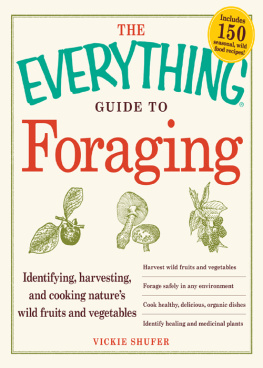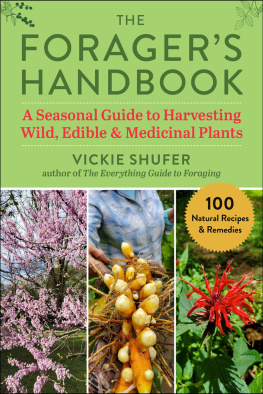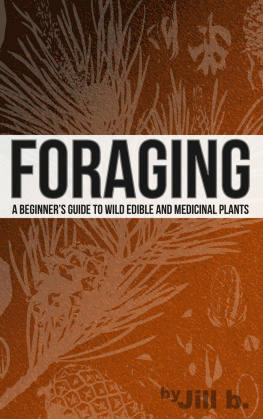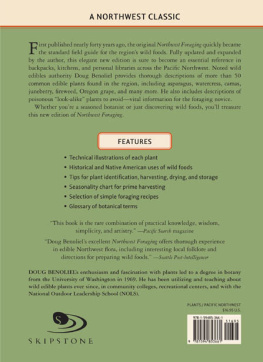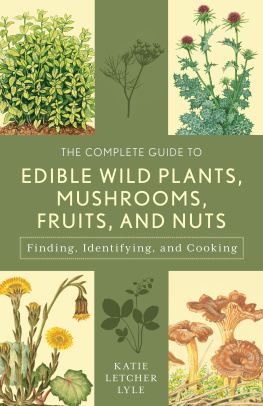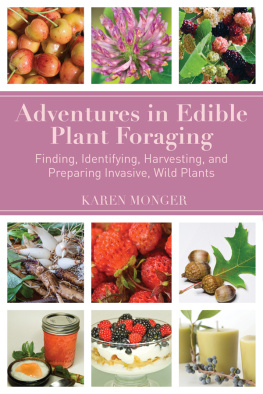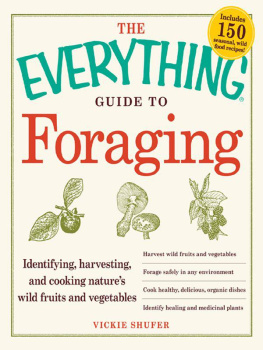THE
EVERYTHING
GUIDE TO
FORAGING
FORAGING
Dear Reader,
Foraging is a skill that has become almost forgotten. Fears of the outdoors and being poisoned prevent too many people from experiencing the joy of picking and tasting the flavors given to us by nature. Yet, it is a skill that our ancestors knew and used on a daily basis. When I see people hold any one of our native nuts in their hands and not have a clue what it is, or when I hear how others have never eaten a wild blackberry because they didnt want to get poisoned, I realize how disconnected our society has become and how important it is to share the knowledge of foraging.
Then I read survival stories in the newspapers. One in particular was about a young girl who had been lost for five days and had survived by eating raspberries. Or I see on the news the long lines of people waiting for handouts after a natural disaster when there is food all around them. And I realize how important it is that we keep this knowledge alive.
Knowledge that isnt used is lost. Its one thing to know how to identify a particular plant and know its edible, but you also need to know how to process and prepare it. This book on foraging can be your guide, leading you out into the field and from there to the kitchen, and finally to the table. It provides you with everything you need to know to get you started on your journey of becoming a forager.
Be wild!

Welcome to the EVERYTHING Series!
These handy, accessible books give you all you need to tackle a difficult project, gain a new hobby, comprehend a fascinating topic, prepare for an exam, or even brush up on something you learned back in school but have since forgotten.
You can choose to read an Everything book from cover to cover or just pick out the information you want from our four useful boxes: e-questions, e-facts, e-alerts, and e-ssentials. We give you everything you need to know on the subject, but throw in a lot of fun stuff along the way, too.
We now have more than 400 Everything books in print, spanning such wide-ranging categories as weddings, pregnancy, cooking, music instruction, foreign language, crafts, pets, New Age, and so much more. When youre done reading them all, you can finally say you know Everything!

PUBLISHER Karen Cooper
director of acquisitions and innovationPaula Munier
managing editor, everything seriesLisa Laing
copy chiefCasey Ebert
assistant production editorJacob Erickson
acquisitions editorRoss Weisman
development editor Brett Palana-Shanahan
editorial assistantRoss Weisman
everything series cover designerErin Alexander
layout designersColleen Cunningham, Elisabeth Lariviere, Ashley Vierra, Denise Wallace
Visit the entire Everything series at www.everything.com
THE
EVERYTHING
GUIDE TO
FORAGING
Identifying, harvesting, and cooking
natures wild fruits and vegetables
Vickie Shufer

Dedicated to the wild plants, that they may be
recognized and appreciated for the gifts they offer.
Copyright 2011 by F+W Media, Inc. All rights reserved. This book, or parts thereof, may not be reproduced in any form without permission from the publisher; exceptions are made for brief excerpts used in published reviews.
An Everything Series Book. Everything and everything.com are registered trademarks of F+W Media, Inc.
Published by Adams Media, a division of F+W Media, Inc. 57 Littlefield Street, Avon, MA 02322 U.S.A. www.adamsmedia.com
ISBN 10: 1-4405-1276-0
ISBN 13: 978-1-4405-1276-6
eISBN 10: 1-4405-2511-0
eISBN 13: 978-1-4405-2511-7
Printed in the United States of America.
10987654321
Library of Congress Cataloging-in-Publication Data
Shufer, Vickie.
The everything guide to foraging / Vickie Shufer.
p. cm.
Includes bibliographical references and index.
ISBN 978-1-4405-1276-6 (alk. paper)
1. Cooking (Wild foods) 2. Wild plants, EdibleIdentification. I. Title.
TX823.S455 2011
641.6dc22
2011006239
This publication is designed to provide accurate and authoritative information with regard to the subject matter covered. It is sold with the understanding that the publisher is not engaged in rendering legal, accounting, or other professional advice. If legal advice or other expert assistance is required, the services of a competent professional person should be sought.
From a Declaration of Principlesjointly adopted by a Committee of the
American Bar Association and a Committee of Publishers and Associations
Many of the designations used by manufacturers and sellers to distinguish their products are claimed as trademarks. Where those designations appear in this book and Adams Media was aware of a trademark claim, the designations have been printed with initial capital letters.
Illustrations by Eric Andrews.
Photo credits on page 291.
This book is available at quantity discounts for bulk purchases.
For information, please call 1-800-289-0963.
Contents
KudzuThe Weed That Ate
the South
Acknowledgments
It is with great pleasure that I can say thank you to all my teachers who have been with me since the beginning, far too many to name individually. I am especially grateful to Dr. James Duke, not only for all his research, but also for sharing his knowledge in classes, workshops, and books. It was he who showed me how to eat cattails out of the marsh, make a soup using burdock and other wild vegetables, and had me testing various wild berries to determine their edibility.
Thanks to all of you who have contributed foraging articles and to the subscribers of The Wild Foods Forum, for sharing your knowledge and experience on wild foods. And to all my wild friends, especially Michele Shean and Diane Greiber, who have been testing out my recipes with wild food groups for more years than I can count; and Michele, who helped me recall how we had prepared certain dishes while I was writing this book. Special thanks to Paul, my husband, who has been graciously eating my experiments for more than thirty years. Most of all, I want to thank all of you who have attended my classes, tasted my dishes, and repeatedly asked when I was going to write a book, for the inspiration that you have provided for me to write this.
Top 10 Reasons to Forage
Foraging increases awareness of the plant world.
The food you find is free for the picking, thereby reducing your food costs.
Foraging provides outdoor exercise.
It is a source of food in survival situations.
Foraging can be a means of weed control in yards and gardens.
The food you forage is free of pesticides, herbicides, and genetic modification.
A foraged diet provides flavors found nowhere else.
Foraged food is highly concentrated in vitamins and minerals.

